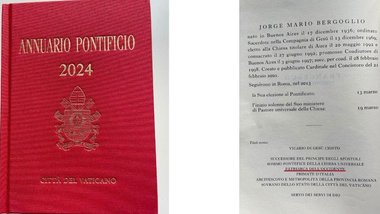Russian Orthodox React To New Catholic Dioceses
On 11 February of this year the Vatican announced the decision of Pope John Paul II to elevate the status of the administrative structures of the Roman Catholic church on Russian territory to the level of dioceses. From now on in Vatican documents the territory of our country will be designated a "church province," headed by a metropolitan. The Russian Orthodox Church is faced with a fait accompli, whereas in our view such matters require preliminary discussion. We view the aforesaid step as unfriendly and undermining the prospects for improvement of relations between the two churches. Historically on the territory of our country the Catholic Church has conducted the spiritual nurture of the flock traditionally belonging to it: Poles, Lithuanians, Germans, and so forth. And thus there did not exist a division of Russian territory into Catholic dioceses and the national Catholic parishes were a part of the Mogilev and Tiraspol dioceses. The creation of a "church province" or "metropolitanate" in essence signifies the creation of a local Catholic church of Russia with its center in Moscow, aspiring to have Russian people as its flock, who culturally, spiritually, and historically have been the flock of the Russian Orthodox Church. The formation in Russia of such a church actually constitutes a challenge thrown down to Orthodoxy which has been indigenous to the territory of the country over the course of many centuries. Such a thing never has taken place in the history of our country. Moreover, such a form of organization of the Catholic Church life is untypical even for Catholic countries, where usually church provinces do not exist with dioceses actually administered by a metropolitan. It is necessary to point out that in conducting the nurture of its believers in Catholic countries, the Russian Orthodox Church has never tried to create church institutions parallel to the Catholic ones. Our dioceses are created for nurturing the Russian-speaking Orthodox diaspora, that is, the flock of the Russian church that find themselves far from the motherland, and not for conducting missionary activity among the local population. If the Catholic Church acted in Russia with such tact and with such good will as we act in Catholic countries, then difficulties would not arise in our relations. The appeals by representatives of the Roman Catholic Church to the idea that they supposedly are restoring Catholic structures that existed in Russia before the 1917 revolution seem to us absolutely incorrect. Almost all of the Catholic dioceses existing in the Russian empire by the beginning of the twentieth century were located on the territory of present-day Poland, Lithuania, Ukraine, and Belarus, and they did not have a single center either in the capital of Russia or in any other city. Since then the borders of our country as well as the ethnic and confessional composition of its population has changed substantially. The number of Catholic believers in contemporary Russia is incomparably less than in the Russian Empire at the beginning of the twentieth century. We are convinced that for nurturing Catholics, who are not very numerous in our country, there was no need to elevate the status of the already existing Catholic church structures and certainly not to form a special church district. Such actions by the Roman Catholic Church, that are not occasioned by real pastoral needs, disclose the missionary goals of the changes that have been made. This is confirmed by numerous cases of missionary activity by Catholic clergy among the Russian population. It is this activity that we call proselytism and constantly point out as one of the basic impediments to improvement of relations between our churches. We especially regret that such a decision by the Vatican was made on the eve of the next regular round of official conversations between our churches, scheduled for the end of February. As a result a serious threat has arisen to the fragile negotiation process which in its turn makes extremely difficult the resolution of the problems and misunderstandings that exist between us. The responsibility before God and history for the sharp worsening of our relations and for the interruption of the hopes that had been perceived for their normalization lies on the leadership of the Roman Catholic Church. What the Vatican has done has struck a blow to the possibility of the Catholic West and Orthodox East cooperating as two great civilizations for the good of Europe and the world. For the sake of momentary advantages the possibility of a joint Christian witness to divided humanity has again been sacrificed. The question arises: will the Vatican continue, as it has constantly asserted, to consider relations with the Orthodox church as relations of dialogue and cooperation, or does it view Orthodoxy as an undesirable competitor? If the latter takes place, then it is not possible to speak of some kind of agreement between us. However, we continue to remind the Vatican: today, when a restless world awaits joint social actions by Orthodox and Catholics, we should not be fighting but be working together. We have maintained good relations with dioceses, parishes, and monasteries of the Catholic Church, as well as cooperation with humanitarian Catholic organizations and educational institutions. It is these examples that permit us to hope that, despite any difficulties connected with the mistaken course taken by the Vatican with regard to the Russian Orthodox Church, relations between Orthodox and Catholics will develop and become an important factor in preserving Christian values in the life of Europe and the world. Turning to our flock, we call them to maintain their fidelity to Holy Orthodoxy. We will calmly and peacefully, but firmly, respond to any attempts to divide our people spiritually. "And so, stand firm, with your loins girt by truth and with the breastplate of righteousness, and your feet shod with readiness to preach the gospel of peace" (Eph 6.14-15) (tr. by PDS, posted 12 February 2002) UNOFFICIAL TRANSLATION >>From Russia Religion News http://www.stetson.edu/~psteeves/relnews/0202b.html#12









